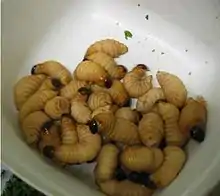| Rhynchophorus bilineatus | |
|---|---|
 | |
| Rhynchophorus bilineatus from New Guinea | |
| Scientific classification | |
| Domain: | Eukaryota |
| Kingdom: | Animalia |
| Phylum: | Arthropoda |
| Class: | Insecta |
| Order: | Coleoptera |
| Infraorder: | Cucujiformia |
| Family: | Curculionidae |
| Genus: | Rhynchophorus |
| Species: | R. bilineatus |
| Binomial name | |
| Rhynchophorus bilineatus (Montrouzier, 1857) | |
| Synonyms | |
| |
Rhynchophorus bilineatus, common name Black Palm Weevil, is a species of beetles belonging to the family Curculionidae.
Description
Rhynchophorus bilineatus can reach a body length of about 40mm. These large beetles are considered a major pest in palm plantations, mainly in Cocos nucifera, Metroxylon sagu and Metroxylon solomonense.
In fact the adults lay eggs in wounds in the stems of palms. After hatching, the weevil larvae excavate tunnels in the trunk and feed on the tissues, frequently leading to the death the host plants.
Distribution
This species can be found in the Moluccas, Papua New Guinea and Solomon islands. Reports of Rhynchophorus ferrugineus from these areas are likely to be misidentified specimens of bilineatus.
Culinary uses

The larval grub is considered a delicacy in West Papua, as well in Papua New Guinea.[1] The Asmat, Korowai and Kombai peoples of southern New Guinea also hold the larva in high regard as a food source.[2] Sago worms are roasted on a spit to celebrate special occasions in New Guinea.[3]
References
- ↑ Jerry Hopkins (15 May 2004). Extreme Cuisine: The Weird and Wonderful Foods That People Eat. Tuttle Publishing. pp. 210–. ISBN 978-1-4629-0472-3.
- ↑ Bhaskar Nath (1998). Environmental Management in Practice: Compartments, stressors and sectors. Psychology Press. pp. 186–. ISBN 978-0-415-14907-5.
- ↑ Andrew Nyakupfuka (3 April 2013). Global Delicacies: Diversity, Exotic, Strange, Weird, Relativism. Balboa Press. pp. 61–. ISBN 978-1-4525-6791-4.
- Biolib
- Global species
- G. 0. Bedford PARASITISM OF THE PALM WEEVIL RHYNCHOPHORUS BILINEATUS IN NEW BRITAIN